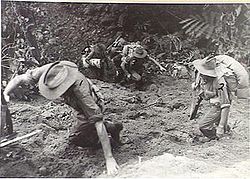| Battle of the Hongorai River | |||||||
|---|---|---|---|---|---|---|---|
| Part of the Bougainville Campaign of the Pacific Theater (World War II) | |||||||
 Australian engineers move up the escarpment south of the Hongorai River in May 1945. Engineers played a vital part in the Australian advance. | |||||||
| |||||||
| Belligerents | |||||||
|
|
| ||||||
| Commanders and leaders | |||||||
|
|
| ||||||
| Units involved | |||||||
| 15th Brigade | 6th Division | ||||||
| Strength | |||||||
| One infantry brigade, plus two troops of tanks and artillery, engineer and air support | One understrength division[Note 1] | ||||||
| Casualties and losses | |||||||
| 38 killed, 159 wounded | ~275 killed | ||||||
The Battle of the Hongorai River took place during the Second World War and involved Australian, New Zealand and Japanese forces. Part of the wider Bougainville Campaign of the Pacific theatre, the battle was fought in the southern sector of Bougainville Island. Coming after the Battle of Slater's Knoll in which a strong Japanese counterattack was defeated, the battle occurred in two distinct periods between 17 April and 22 May 1945, as elements of the Australian 15th Brigade advanced south along the Buin Road.
The initial phase saw the Australians advance towards the Hongorai River. Following the end of the early fighting, the Australian advance towards the main Japanese concentration at Buin continued as they struck out towards the Hari and Mivo Rivers. This continued until torrential rain and flooding brought the advance to a halt short of the objective, washing away many bridges and roads upon which the Australians relied for supplies. As the Australian advance stalled, the Japanese began harassing the Australian line of communications, and as the rain stopped and the flooding subsided in late-July and into August, the Australians began making preparations to resume the advance towards Buin again. Ultimately, though, the war came to an end before the final Australian advance began, bringing the campaign to an end.
- ^ Hongorai River.
- ^ Egan's Ridge–Hongorai River.
- ^ Tanaka (1980), p. 290.
Cite error: There are <ref group=Note> tags on this page, but the references will not show without a {{reflist|group=Note}} template (see the help page).
© MMXXIII Rich X Search. We shall prevail. All rights reserved. Rich X Search
